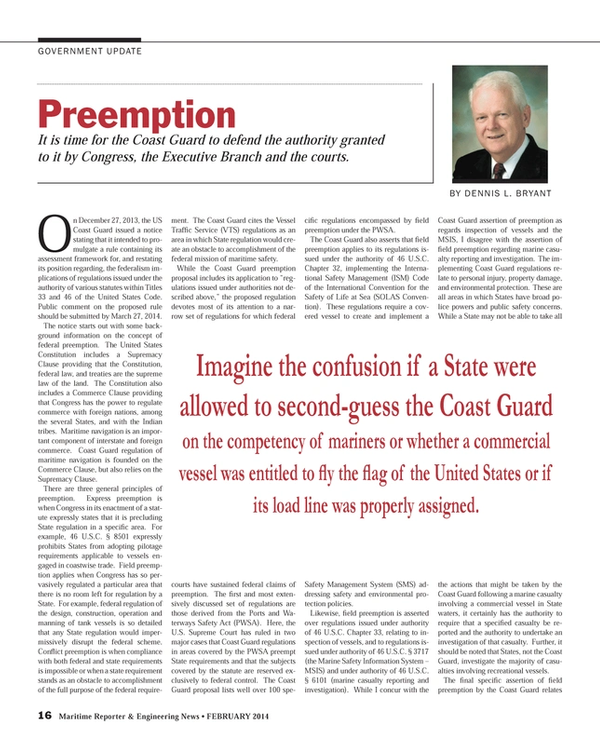
U.S. Coast Guard Must Assert its Authority
It is time for the Coast Guard to defend the authority granted to it by Congress, the Executive Branch and the courts.
On December 27, 2013, the U.S. Coast Guard issued a notice stating that it intended to promulgate a rule containing its assessment framework for, and restating its position regarding, the federalism implications of regulations issued under the authority of various statutes within Titles 33 and 46 of the United States Code. Public comment on the proposed rule should be submitted by March 27, 2014.
The notice starts out with some background information on the concept of federal preemption. The United States Constitution includes a Supremacy Clause providing that the Constitution, federal law, and treaties are the supreme law of the land. The Constitution also includes a Commerce Clause providing that Congress has the power to regulate commerce with foreign nations, among the several States, and with the Indian tribes. Maritime navigation is an important component of interstate and foreign commerce. Coast Guard regulation of maritime navigation is founded on the Commerce Clause, but also relies on the Supremacy Clause.
There are three general principles of preemption. Express preemption is when Congress in its enactment of a statute expressly states that it is precluding State regulation in a specific area. For example, 46 U.S.C. § 8501 expressly prohibits States from adopting pilotage requirements applicable to vessels engaged in coastwise trade. Field preemption applies when Congress has so pervasively regulated a particular area that there is no room left for regulation by a State. For example, federal regulation of the design, construction, operation and manning of tank vessels is so detailed that any State regulation would impermissively disrupt the federal scheme. Conflict preemption is when compliance with both federal and state requirements is impossible or when a state requirement stands as an obstacle to accomplishment of the full purpose of the federal requirement. The Coast Guard cites the Vessel Traffic Service (VTS) regulations as an area in which State regulation would create an obstacle to accomplishment of the federal mission of maritime safety.
While the Coast Guard preemption proposal includes its application to “regulations issued under authorities not described above,” the proposed regulation devotes most of its attention to a narrow set of regulations for which federal courts have sustained federal claims of preemption. The first and most extensively discussed set of regulations are those derived from the Ports and Waterways Safety Act (PWSA). Here, the U.S. Supreme Court has ruled in two major cases that Coast Guard regulations in areas covered by the PWSA preempt State requirements and that the subjects covered by the statute are reserved exclusively to federal control. The Coast Guard proposal lists well over 100 specific regulations encompassed by field preemption under the PWSA.
The Coast Guard also asserts that field preemption applies to its regulations issued under the authority of 46 U.S.C. Chapter 32, implementing the International Safety Management (ISM) Code of the International Convention for the Safety of Life at Sea (SOLAS Convention). These regulations require a covered vessel to create and implement a Safety Management System (SMS) addressing safety and environmental protection policies.
Likewise, field preemption is asserted over regulations issued under authority of 46 U.S.C. Chapter 33, relating to inspection of vessels, and to regulations issued under authority of 46 U.S.C. § 3717 (the Marine Safety Information System – MSIS) and under authority of 46 U.S.C. § 6101 (marine casualty reporting and investigation). While I concur with the Coast Guard assertion of preemption as regards inspection of vessels and the MSIS, I disagree with the assertion of field preemption regarding marine casualty reporting and investigation. The implementing Coast Guard regulations relate to personal injury, property damage, and environmental protection. These are all areas in which States have broad police powers and public safety concerns. While a State may not be able to take all the actions that might be taken by the Coast Guard following a marine casualty involving a commercial vessel in State waters, it certainly has the authority to require that a specified casualty be reported and the authority to undertake an investigation of that casualty. Further, it should be noted that States, not the Coast Guard, investigate the majority of casualties involving recreational vessels.
The final specific assertion of field preemption by the Coast Guard relates to regulations issued under authority of the Act to Prevention Pollution from Ships (APPS), which implements the MARPOL Convention. Few would argue with this position. It must be noted, though, that California continues to enforce its air emission regulations out to 24 nautical miles off the coast of that State, which directly conflicts with MARPOL Annex VI and the provisions of the North American Emissions Control Area (ECA).
Other than the minor issues noted above, I concur with the Coast Guard approach – with one glaring exception – it is too conservative. The approach would largely put into regulation what courts have already decreed. It plows almost no new ground. Reading the judicial decisions and the legal principles on which they are based leads one to the conclusion that there is much more that the Coast Guard does that also preempts State action.
Treaties of the United States have supremacy over State law. The United States has ratified numerous maritime treaties addressing topics where States are prohibited from treading. The principal maritime treaty is the SOLAS Convention. This convention covers everything from vessel structure to fire safety to lifesaving appliances to radio communications to safety of navigation to carriage of cargo (including dangerous goods) to maritime security. The Coast Guard asserts preemption with regard to MARPOL, but somehow omits to mention its preemption with regard to the more important SOLAS Convention. The same arguments are equally valid with regard to the Load Line Convention and the STCW Convention, to cite the most prominent. These and other international maritime conventions are all woven together into a comprehensive network. States cannot dabble in these areas without creating an obstacle to fulfillment of the underlying concept.
This broad unifying concept of marine safety, security, and environmental protection underlies the foundation of 46 U.S.C. § 2103 which states:
The Secretary [of the Department within which the Coast Guard is operating] has general superintendence over the merchant marine of the United States and of merchant marine personnel insofar as the enforcement of this subtitle is concerned and insofar as those vessels and personnel are not subject, under other law, to the supervision of another official of the United States Government. In the interests of marine safety and seamen’s welfare, the Secretary shall enforce this subtitle and shall carry out correctly and uniformly administer this subtitle. The Secretary may prescribe regulations to carry out the provisions of this subtitle.
The “Superintendence of the merchant marine” statute is a broad delegation of authority and its mandate for uniformity is only achievable if States are prohibited from involvement. Imagine the confusion if a State were allowed to second-guess the Coast Guard on the competency of mariners or whether a commercial vessel was entitled to fly the flag of the United States or if its load line was properly assigned. These are areas in which States are preempted from acting, just as much as the areas specifically cited in the Coast Guard’s recent proposal.
It is time for the Coast Guard to defend the authority granted to it by Congress, the Executive Branch, and the courts. I recommend that the Coast Guard revise and broaden its assertion of preemption so that it is clear to the several States, to the maritime industry, and to the public that the Coast Guard truly does superintend the merchant marine and will challenge any attempt by State and local governments to impermissibly interfere. Now is not the time for unwarranted reticence.
The Author
Dennis L. Bryant is with Maritime Regulatory Consulting, and a regular contributor to Maritime Reporter & Engineering News as well as online at MaritimeProfessional.com.
t: 1 352 692 5493
e: [email protected]
(As published in the February 2014 edition of Maritime Reporter & Engineering News - www.marinelink.com)
Read U.S. Coast Guard Must Assert its Authority in Pdf, Flash or Html5 edition of February 2014 Maritime Reporter
Other stories from February 2014 issue
Content
- Something Old, Something New ... page: 06
- Floating Production Market Forecast page: 10
- The FLNG Market is Poised for Growth page: 12
- Managing BWT Costs and Compliance page: 14
- U.S. Coast Guard Must Assert its Authority page: 16
- Transferring Risk for Long-term Success page: 18
- You Can Run, But You Can’t Hide page: 24
- Cruise Industry Poised for Global Growth page: 26
- MIOX Safe Water Management for Cruise Ships page: 28
- Five Minutes With Tomas Tillberg page: 30
- SS United States: Leading Lady to Damsel in Distress page: 32
- Alfa Laval: Green & Efficient Shipping page: 42
- Oily Wastewater Transformed with WETT-O page: 45
- Siemens System Controls Filter Biofouling page: 46
- New BWM Regs Cometh - Are you ready? page: 46
- Valve Train Halves Idle to Full Load Time page: 48
- Unmanned Ships Now a Reality page: 49
- Five Minutes with WSS's Simon Hutt page: 50
- Hempel Debuts Hempaguard page: 54
- Ecofix Corrosion Repair with Ecoshield Application page: 54
- Envelop Protective Covers page: 55
- GAC Launches Eco-friendly Hull Cleaning Solution page: 56
- CS Unitec Debuts Trelawny Floor Planer page: 56
- New Hatch Sealing Tape page: 57
- New Aluminum Vise Action Compression Latch page: 57
- High Strength, Vibration Resistant Fastener from Huck page: 57
- Gumdrop Debuts Cases for Marine Industry page: 57
- New Handheld Marking System FlyMarker PRO page: 57
- Viking Refits Four NGSCO Vessels with LRRS System page: 57
- DNV GL Debuts New Explosion Hazard Software page: 57
- Handy, Quick Legionella Tests for Cruise Ships page: 58
- AMSOIL Introduces New Arctic Synthetic Grease page: 58
- Clean Marine to Supply EGCS for Tanker Newbuilds page: 58
- Engineered Ventilation Systems Keep Engine Rooms Humming page: 58
- New FARO Laser Scanner Focus3D X 33 page: 58


